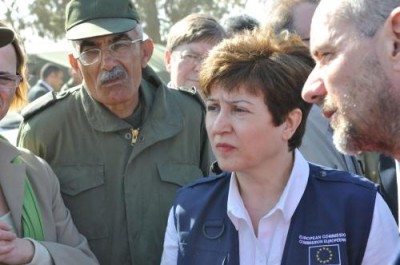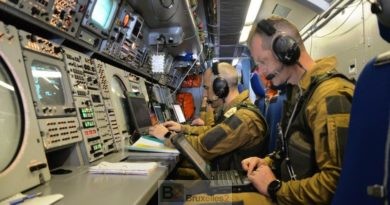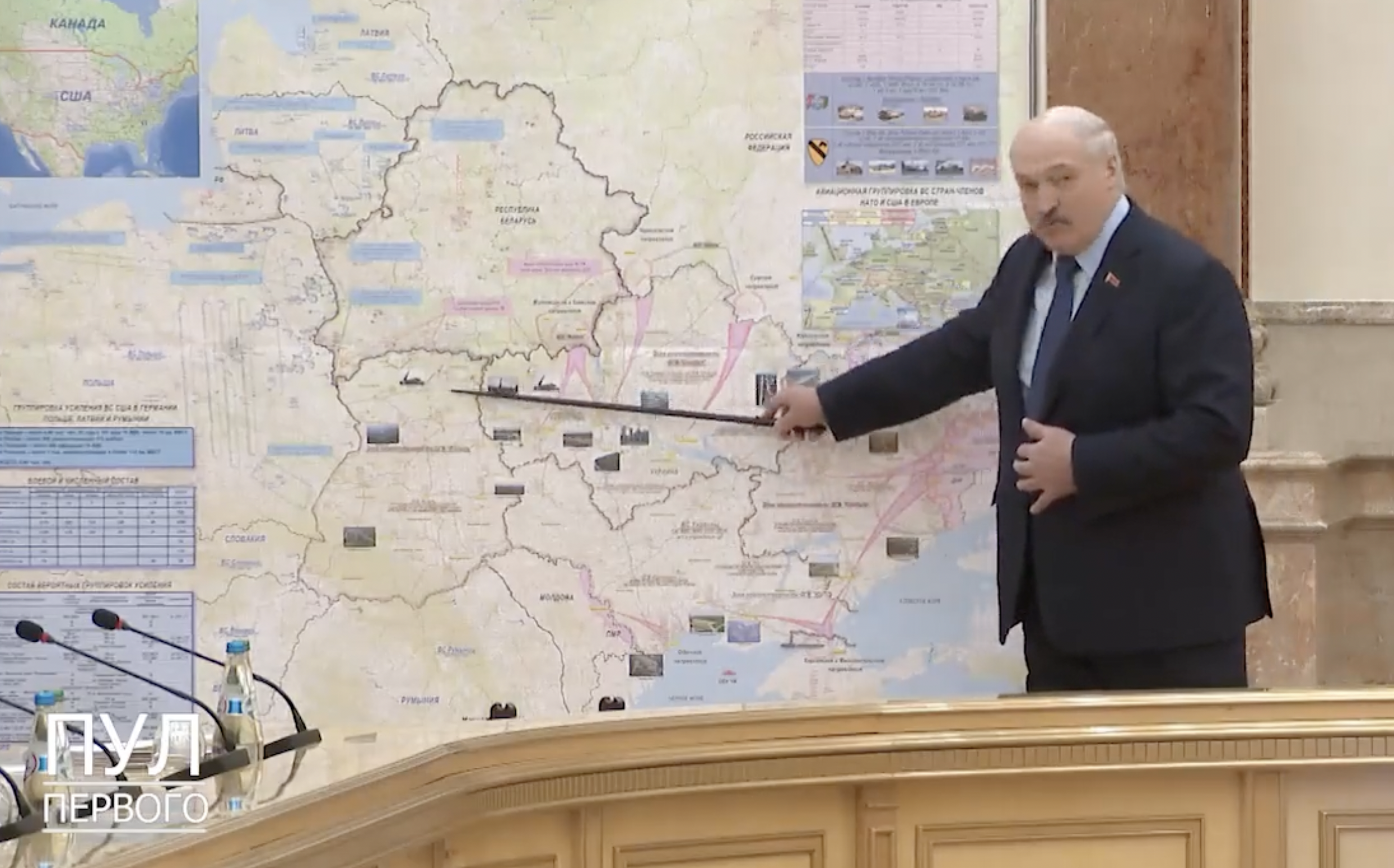K. Georgieva: Tripoli must guarantee access to humanitarian organizations

(BRUSSELS2) Kristalina Georgieva, European Commissioner for Humanitarian Aid, Crisis Response and International Cooperation, was in Tunisia on March 3, at the Ra's Jedir border with Libya. We had agreed to talk to each other again when he returned.
The Commissioner reiterates her call on the Libyan regime in Tripoli to allow access for humanitarian workers to the areas it controls. She does not have enough harsh words for the Gaddafi regime which does not respect international rules. But she believes that the solution of humanitarian corridors under force protection is not a solution, at least currently. The neutrality and impartiality of humanitarian organizations must be preserved. Regarding the arrival of refugees on the Tunisian side, she praises the speed of the European response. But above all, it calls for support and repatriation of the inhabitants of the poorest countries (Bengalis, Africans, etc.). And to be ready for any crisis. The situation is very fluid.
You called on Friday for access for humanitarian workers to all parts of Libya. Should you reiterate this call today?
Yes. We call again and again for humanitarian access to all parts of Libya. The ICRC is waiting on the other side of the border (in Tunisia). He has not yet received permission to enter. You have to keep the pressure on. It is important. Libya has international obligations that it must respect.
You don't currently have access everywhere?
No. My big concern is in the west, near Tripoli. We have very little information. And it's very difficult to get there. Even the Libyan Red Crescent, which is doing remarkable work - it must be emphasized - has great difficulty getting anywhere. Tripoli must do everything to allow humanitarian action to be deployed in this part of Libya (NB: the west is mainly under the control of the Libyan regime of Col. Gaddafi). The international community must support this movement. I hope that the mission sent by the High Representative and Vice-President of the Commission, Catherine Ashton, will return with good news.
And on the eastern side of Libya, under the control of the Libyan National Council?
We don't have the same problem. It's easier. We also have a team of 2 people from ECHO (the European Humanitarian Aid Office) in Benghazi, teams from MSF (Médecins sans frontières) and the ICRC (International Committee of the Red Cross) on site. An assessment was carried out on the six hospitals in the city. And the conclusions are reassuring. The medical situation is well monitored. The humanitarian situation is, as far as possible, satisfactory. At least, at today's time (Sun. March 6 morning). There are certain needs such as medicines and medical products. But no food shortage. However, this could become a problem in the future if security conditions deteriorate. The United Nations thus had to suspend certain supplies because of the military actions in progress (NB: a WFP ship, the world food program thus had to turn around). We have to follow the situation very closely.
“We must not rush with military convoys.
We would break our neutrality and our impartiality by doing this"
Isn't it then necessary to set up humanitarian corridors, if necessary with military support?
The humanitarian community is very sensitive not to impose humanitarian access routes, corridors, by military means. We have to think of all the options. But we have to be very careful. Do not take counterproductive measures. And think about the future. There are now clearly two sides. If the conflict lasts, we will need impartial and neutral access. The humanitarian cannot be on one side more than another. We must not rush with military convoys. We would break our neutrality and our impartiality by doing that. Humanitarians are professionals; if they need military protection, they will say so. You don't have to say it for them.
How do you view the attitude of the Gaddafi regime?
Again, I have to side with humanitarian principles. It's my role. And I'm really angry. International rules — access to humanitarian organizations, not attacking civilians, etc. — must be respected whatever the cause of this conflict. A regime that doesn't has no place in the world of 21e century. This regime must go.
For you, this conflict is a revolution, a civil war?
It is a situation of unrest (Unrest). The Libyan people are revolting and fighting against Gaddafi and an oppressive regime. The ICRC has not yet classified this conflict as a civil war. They remain cautious.
At the Tunisian border,
“We must help the most vulnerable to return home”
You were at the Tunisian border on Thursday, are you worried about the situation today with these thousands of refugees arriving?
It must be said above all that the Tunisian authorities, the Tunisian Red Crescent, the international organizations (UNHCR/IOM...) are doing a good job on the spot. I was able to verify it. Very quickly, they set up transit camps at the border and at the airport for arriving refugees, as well as mobile hospitals. The only concern we have is hygiene in these camps. According to the information I received from the ECHO and MIC team who are on the spot, it is not yet resolved. (...) In this camp, there are many young men, very few women and children. We have set up football pitches for them to burn off their energy.
What is the typology of people arriving?
The situation is changing very quickly. We have seen the Tunisians arrive, then the Egyptians, and in the last days, Bengalis, very vulnerable, very poor, having little business with them. They really need us, the international community. Finally, we see Libyans arriving, not many from 1000 to 2000. But this is new. And we can expect more to arrive in the coming days.
priority now at the Tunisian border ?
The main priority is to help those who have the most difficulty in returning home, to repatriate them. But it is also important to have "stand by" capabilities. We don't know what tomorrow has in store for us, where other refugees will arrive, or what profiles they will have, and where they will have to be repatriated.
The flow seems to have dried up in recent days . Your explanation?
We see on the satellite photos that there are gatherings of people on the Libyan side. Are these camps to prevent people from leaving the territory, or simply to gather them before departure, … it is difficult to say.
How do you assess the European response?
She was exceptionally generous. The Member States have responded in an exceptionally generous way, in terms of means, in financial terms. This made it possible to set up an airlift, quickly. Many States are participating (Belgium, Bulgaria have just sent resources). I have just come from Geneva, where the international organizations expressing their thanks for the way Europe has responded.
What strikes you in this crisis?
His unforeseen and... unpredictable side. It is therefore necessary to know how to respond quickly to a very changing situation. Means must be prepositioned. We should, for example, expect arrivals from the Egyptian side if the crisis worsens in the east.
NB: Interview conducted by telephone on Sunday March 6 in the morning(date and time are important in this context where the information is very changing)
Read also:
- Europe does not have to be ashamed of its humanitarian action. A new European choir?
- A European Union exploratory mission to Libya and Tripoli
- Worrying situation for refugees coming from Libya. Call for humanitarian access
- Refugees at the Libyan border. Operation Pegasus II triggered
- An air and sealift to evacuate refugees from Tunisia (maj5)


